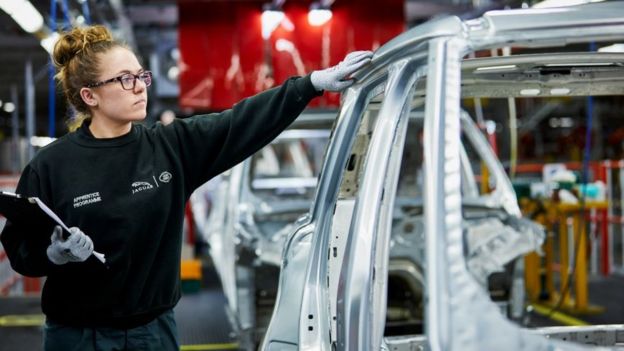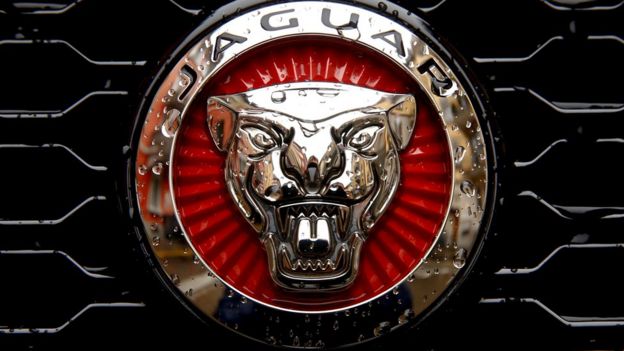
Jaguar Land Rover has warned that a "bad" Brexit deal would threaten £80bn worth of investment plans for the UK and may force it to close factories.
The UK's biggest carmaker, owned by India's Tata Motors, said its "heart and soul is in the UK".
But without frictionless trade JLR said its UK investment plans would be in jeopardy.
The warning came as Downing Street set out details of a possible post-Brexit customs arrangement.
Jaguar Land Rover chief executive Ralf Speth said: "A bad Brexit deal would cost Jaguar Land Rover more than £1.2bn profit each year.
"As a result, we would have to drastically adjust our spending profile. We have spent around £50bn in the UK in the past five years - with plans for a further £80bn more in the next five.
"This would be in jeopardy should we be faced with the wrong outcome."
Mr Speth said the firm urgently needs "greater certainty" to continue to investing heavily in the UK.
He told the Financial Times: "If I'm forced to go out because we don't have the right deal, then we have to close plants here in the UK and it will be very, very sad. This is hypothetical, and I hope it's an option we never have to go for."

Uncertainty over Brexit, as well as the future of diesel cars, has already led the carmaker to announce a series of changes to its UK business.
At the beginning of the year, JLR said it would cut production at its plant in Halewood, Merseyside where it builds three of its Range Rover models.
In April, it decided not to renew the contracts for 1,000 temporary workers in Solihull.
Last month, JLR said it would shift production of the Land Rover Discovery SUV to Slovakia, potentially leading to some UK job losses.
However, the carmaker also said that it was investing in its Solihull site to allow it to build its new Range Rover models, some of which will be electric-powered, from 2020.
PB Balaji, chief financial officer at Tata Motors, said: "Jaguar Land Rover and Tata Motors have always maintained that the uncertainties from Brexit are avoidable and the business seeks clarity to ensure that industry takes timely and right decisions to manage the transition.
"Additionally, Jaguar Land Rover needs free and full access to the single market beyond transition to remain competitive which we also firmly believe is in the best long term interests of the United Kingdom.
"The recent statement from JLR only reaffirms this position that a Brexit which increases bureaucracy, reduces productivity and competitiveness of the UK industry is in no-one's interest."

As well as Halewood and Solihull, JLR also has a manufacturing plant in Castle Bromwich, Birmingham where it makes its Jaguar cars.
Last year, it made more than 600,000 cars, 20% of which were sold to mainland Europe, one of its biggest markets.
JLR said that it spent £5.67bn with UK suppliers of production parts during its last financial year, as well as £5.37bn with EU-based businesses.
Simon Jack, BBC business editor
JLR may be Indian-owned, but its brand and - as the company puts it - its heart and soul is in the UK.
It employs 40,000 people directly and 260,000 work in its supply chain. JLR's warning follows those of Airbus, BMW and Nissan who have all said further investment in the UK is "under review" and could be cancelled if the country leaves the EU without a deal that ensures frictionless trade.
JLR insiders say £80bn worth of future investment in the UK over the next five years "could be lost".
The intervention of such a major employer - which in many ways is rightly perceived as more British than the likes of BMW, Airbus and Nissan - will heap more pressure on the government ahead of a crunch meeting of government ministers on Friday. At this meeting, business hopes the government will finally settle on its own preferred version of the UK's future economic relationship with its largest market.
Business Secretary Greg Clark said the government was "determined" to make sure JLR could "continue to prosper and invest in Britain".
The Jaguar Land Rover warning follows similar statements from BMW and Airbus. However, Health Secretary Jeremy Hunt has called these warnings "completely inappropriate".
Meanwhile, the British Retail Consortium (BRC) has warned in a letter to Prime Minister Theresa May and EU chief negotiator Michel Barnier that failure to reach an agreement to ensure frictionless trade will result in customs delays for perishable goods.
The BRC says that a third of the food consumed in the UK is imported from the EU.